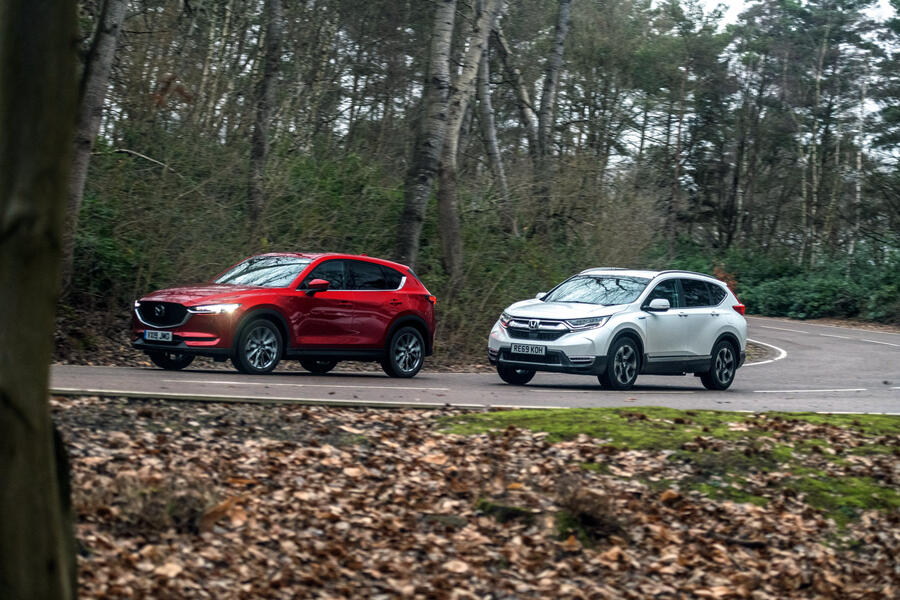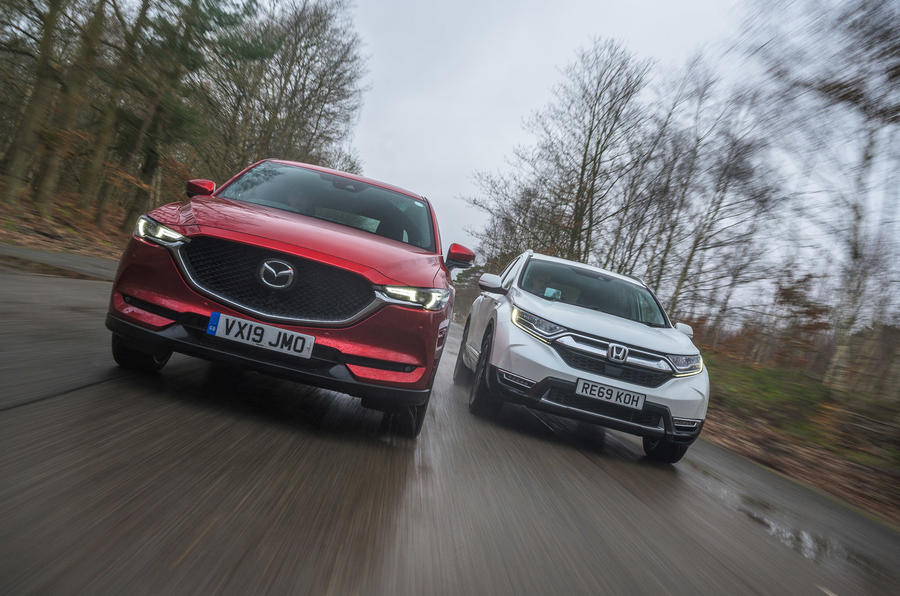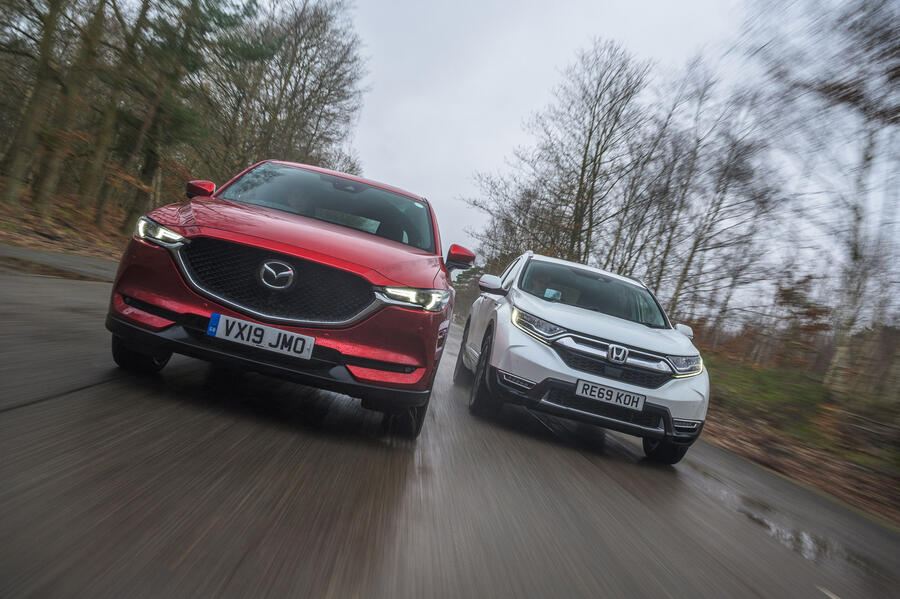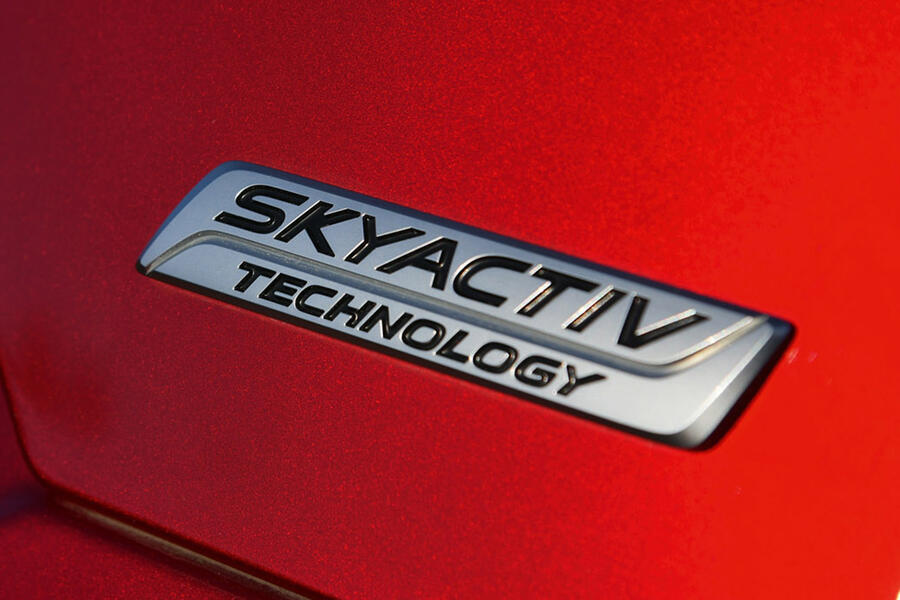So, the Honda CR-V has toppled its compatriots and emerged victorious as Japan’s leading hybrid SUV. Job well done, Honda.
The question now, then, is how does the CR-V – and specifically its conventional, non-plug-in hybrid powertrain – fit into the broader SUV class? It’s a class that, historically speaking, has relied largely on good old fashioned diesel engines for the effortless torque, lower CO2 levels and superior long-distance economy that they so often provide, so does the CR-V have what it takes to overtake diesel as the go-to powertrain choice in this hotly contested segment?
To answer that, we’re rolling out a final contender. A final boss level, if you will, which seems rather fitting for a car that emerged from the same country that gave us Nintendo, PlayStation and Sega game consoles.

Conveniently (for the purposes of this metaphor anyway), the oil-burning Bowser that our Mario will face in this ultimate showdown also hails from Japan. The Mazda CX-5, represented here in range-topping £38,010, 182bhp, all-wheel-drive GT Sport Nav+ guise, is a car of which we’re already rather fond. Its eligibility for this test was determined by the fact that it placed very highly in our SUV mega-test we ran back in 2018. It might not have won, but runner-up to the Volvo XC40 – deemed to be just a bit too compact to give it a fair shot here – is nothing to be ashamed of.
The Mazda might be more of a match for the Honda in terms of its dimensions than the aforementioned Swede, but the CR-V’s boxier, more pragmatic shape sees it draw first blood on grounds of interior spaciousness. Compared with that of the handsome, sharply styled Mazda, the CR-V’s cabin is an altogether airier affair – albeit one that doesn’t look or feel quite as classy or neatly minimalist as that of the CX-5.




















Join the debate
Add your comment
WLTP
WLTP CAN be bypassed, now that Brexit has happened. Can, is a difficult of a word as is the enormous number of Brits needed to go against the U.N.; Too many progressive Influencers in Britain would cut off their own arms just to be affiliated with the uber-progressive U.N. rather than escew it's "findings"
But it could happen... The UK has the clear legal rationale to bypass WLTP - But since WLTP is PURELY a political weapon, the subsequent process would be nastier and more divise than leaving the Common Market was, Me reckons
Company drivers they do not
Company drivers they do not know how well off they are a£36k Rav4 will costbtge about £1730 a year. You show me anyone who can get a hew car tax insured and serviced for tgst amiuhtbof money. Its s joke.
Once again its people like me who pay the most, private car owner cannot get tax relief . Of any sort its a joke it should be people who buy there car and pay to service tgem who get tax breaks not people getting new cars from tger company and paying £1700 a year.
As a ounluc sector worker i gad to yse my own car all i gitvwas ornce oer mile which was taxed @ 20% i payed my own insurance, road tax, servicing, etc to keep the car on the road comoany car driver do not know how lucky they are. So it annoys ne when they go no about bik tax like there being heavily taxed.
I pay road tax, tax when i buy the car! tax on the insurance tax on serviving tax on oarts tax in fuel. Its the private car owner who oays the most tax and get nothing back
Private car owner should not pay tax and this extra tax on cars over £40000 is a con it stops people buying EV
As I've been saying for ages
The penny has finally dropped.
Cobnapint wrote:
Your thinking of plug-ins
These are non-plug in models and have quite a small, light battery and are far from flawed as it allow energy recovery and other benefits such as in effect moving excess power temporarily saved to when you need more power.
This test actually proves that hybrids now let petrol cars virtually match diesels for power and economy but with the advantage of no rattly diesel tractor engines, no filling with stinky greasy diesel, and being allowed to drive into central Bristol when they ban them. Diesel is dead.
Cobnapint wrote:
Utter nonsense. Hybrids capture energy from deceleration that would otherwise be wasted and use that to help provide drive, thus reducing fuel consumption. The only flawed bit of a hybrid is the UK tax system that rewards company car drivers for buying a plug-in hybrid but doesn't require them to ever plug it in.
Will86 wrote:
I agree on all points. But the last one can be fixed by employers. Instead of the usual fuel card, some companies now reimburse business use with advisory fuel rates (AFRs) via their expense system. The driver pays for the fuel and claims back their business miles this way, it greatly incentives plugging in as domestic electricity miles are far cheaper than petrol miles so the driver keeps more money, in fact for faster drivers it becomes essential to avoid them being out of pocket personally.
Clueless!